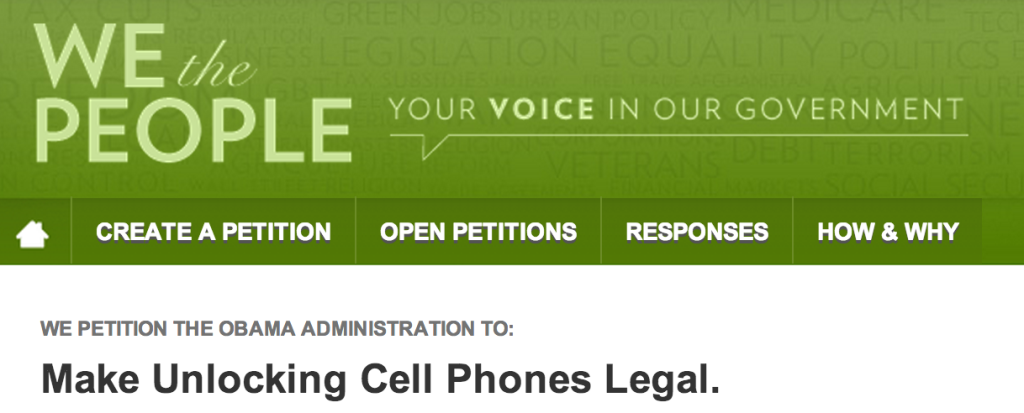A petition on the White House’s “We The People” petition site is currently around 10,000 signatures short of reaching the Administration’s newly-imposed threshold of 100,000 signatures to garter a response from the government.
The White House’s petition site originally only required 5,000 signatures to receive a response from the Administration. However, after a series of petitions which raised disdain in the eyes of the Obama Administration, the limits were raised to 25,000, and later, 100,000 signatories.
This petition asks the Obama Administration to direct the Library of Congress to renew its prior exemption to the Digital Millennium Copyright Act (DMCA), and/or endorse legislation that would ensure cell phone unlocking is legal for a consumer to perform at all times.
It’s a common misconception that DMCA exemptions, which require renewal regularly by the Library of Congress, make an action illegal if they aren’t renewed. A previous exemption to legalize “abandonware” was not renewed by the Library of Congress, but the failure to renew that exemption did not make abandonware illegal… it only potentially made illegal the process of bypassing copy protection mechanisms to use abandoned software.
We’re left today in a similar state with unlocking a cell phone. It may or may not be illegal, but it certainly is a gray area. Court cases have certainly rendered it illegal in certain jurisdictions to bulk-buy locked/prepaid phones, and unlock them for mass sale. For consumers, it’s much more murky. Obviously, it would be a PR debacle to press charges for someone unlocking a phone.
What the DMCA has done, is forced the industry of unauthorized cell phone unlocking, offshore. There are few, if any, companies developing third-party unlocking methods that operate within the United States.
In refusing to renew the DMCA exemption, the Library of Congress cited a changing wireless industry. And, they are right, the industry has changed since the exemption was crafted. Devices like Nexus 4 have made unlocked devices finally mainstream. Likewise, carrier devices have become more tied to their respective networks; it’s not possible today to sell an unlocked LTE device for multiple LTE networks. Ask iPad.
The carriers have played into this fact. Both AT&T and T-Mobile now offer free phone unlocking for all customers. Of course, the carriers now have devices that are only compatible with one-another’s networks on the 2G band. Verizon sells their phones unlocked as part of the 700 MHz C Block spectrum agreement with the FCC. Sprint’s devices are largely incompatible with other networks, due to both firmware and provisioning locks that extend beyond a subsidy lock.
Regardless, a DMCA exemption on phone unlocking could encourage device manufacturers to go the extra mile, and offer additional LTE bands and HSPA bands that they otherwise wouldn’t. Realizing that resale value is important in continuing sales (ask Palm), it may encourage manufacturers to create unlock-friendly devices in the future.
The White House petition will close for signatures on February 23.
Update: The petition has hit its 100,000 required signatures, and will receive a formal response from the Administration. The petition will still be open for additional signatures through the 23rd.

As of the time I wrote this comment it’s less than 1800 signatures away from 100K.
Legalize Phone Unlocking!!
Looks like the petition has hit its 100,000 required signatures. But, keep signing if you want to bump that count even higher.